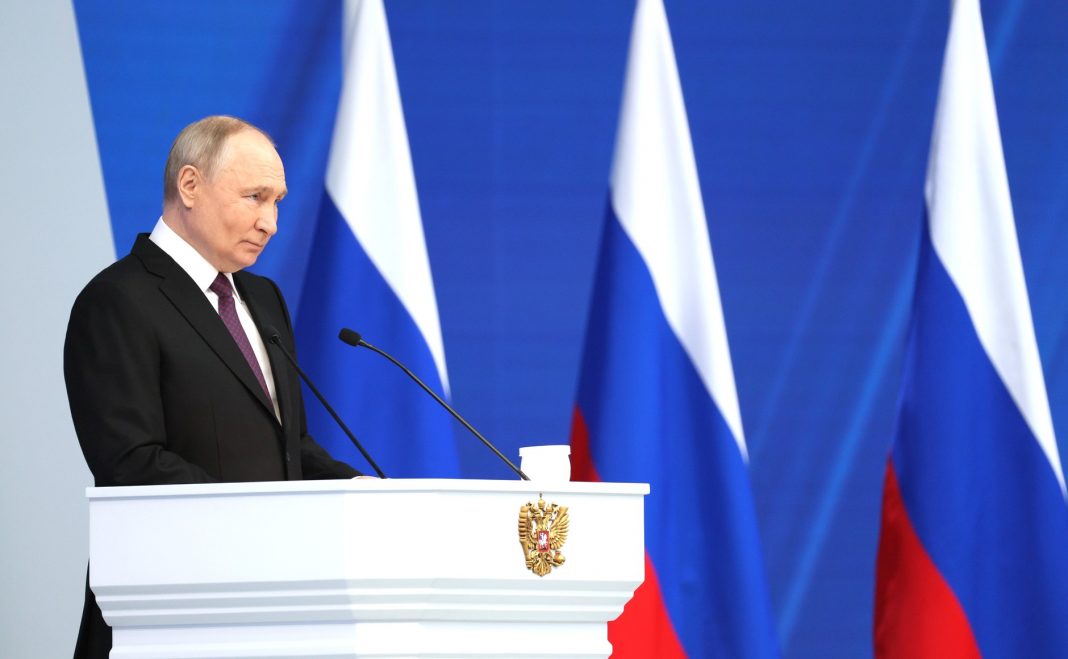On February 29, 2024, Russian President Vladimir Putin delivered a message to the Federal Assembly. In fact, this is an annual Address and an announcement of Putin’s election program and his action program for the next six years. Putin’s speech was one of the longest, lasting 2 hours, 6 minutes 38 seconds. Putin broke the record for the longest speech with a message – in 2018, he spoke for 1 hour and 55 minutes.
At the beginning of his speech, Putin said that the message was based, among other things, on communication with people from the regions and members of the so-called “Special Military Operation” and on the opinions of expert forums. The main emphasis was on unity, unity, and the unity of the entire people. It is no coincidence that the Russian President said the country faces great challenges that can only be achieved together.
In this article, Ascolta analyses the main points from Vladimir Putin’s Address to the Federal Assembly and identifies the possible subtext embedded in one of the main election speeches of the Russian President.
This Content Is Only For Subscribers
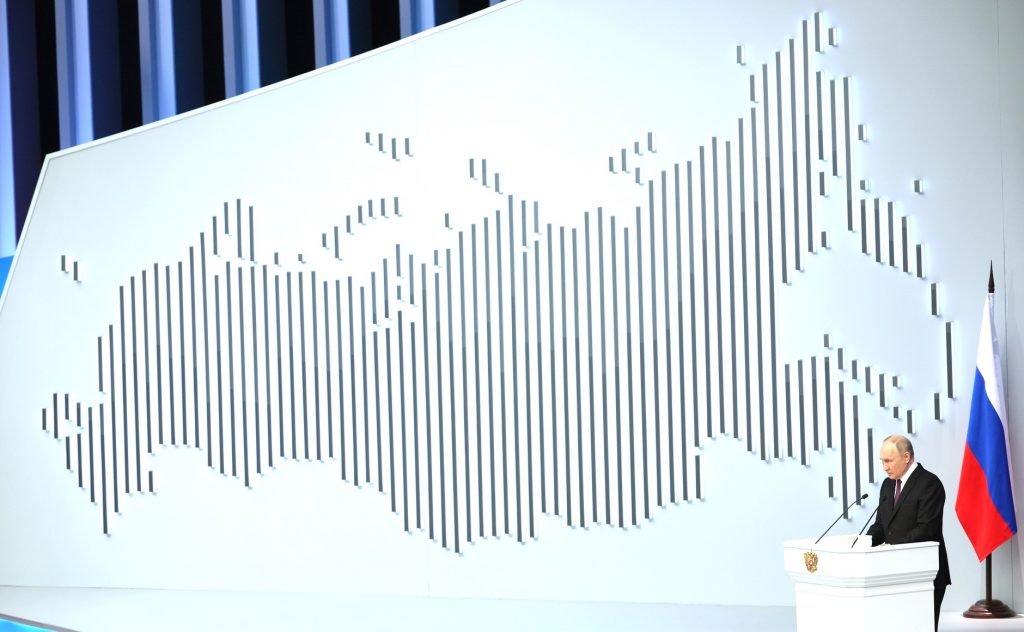
The first part of the speech was devoted to the war in Ukraine (“special military operation” – according to the terminology officially adopted in the Kremlin).
“The absolute majority of the Russian people supported the [so-called] SMO. People are adamant in this choice,” said the Russian President. Putin recalled that this year marks the 10th anniversary of the “Russian Spring”: “We preserved the unity of the country and did not allow it to be torn apart,” he stated. According to him, Russia has proven to respond to any challenges. “Values such as mercy, mutual support, and solidarity prevail in Russian society,” Putin said.
The Armed Forces immediately sent a message: “Our heroes on the front line in the trenches, where it is most difficult, know that the whole country is behind them. Russian business has donated billions of rubles to volunteers and charitable foundations to support fighters.” A high level of pathos is characteristic of the first and last parts of the Address – this is a traditional technique of the Russian President.
Then, Putin continued to the current situation of global affairs. However, if earlier he dwelt in detail on specific regions, challenges, and opportunities, in this message, Putin restrained himself to broad expressions about democracy, relations with the West, etc.
“We will continue developing the democracy institutions; we will not allow anyone to interfere in internal affairs,” Putin said, further developing Surkov’s thesis about “sovereign democracy,” which he once liked. Putin focused on the need to strengthen the sovereignty of the Russian Federation. “We will only determine our path and cherish traditions, solve problems based on our worldview,” the Russian President emphasised. “Russia’s independence, self-sufficiency, and sovereignty need to be confirmed daily,” Putin believes.
“The West miscalculated, colliding with the firm position and determination of our multinational people,” Putin stated, after which he announced a minute of silence in memory of the fallen soldiers.
According to Putin, the entire Russian economy showed flexibility and stability during the [so-called] “special operation” (this thesis has been repeatedly used recently as evidence that Russia is not afraid of Western sanctions). Putin called Russia’s political system one of the pillars of its sovereignty.
Describing the situation on the fronts, Putin said, “Our units are advancing confidently,” and “The Russian army gained enormous combat experience during the [so-called] “special operation.” A whole galaxy of commanders has grown up, caring for people and competently performing their duties. We see where we have problems, understand what needs to be done, and this work is ongoing.”
An important point: Putin gave carte blanche to the top generals, making it clear that he will not carry out purges and replacements, which may not particularly please the so-called “military correspondents” who conflict with the command of the Russian Armed Forces.
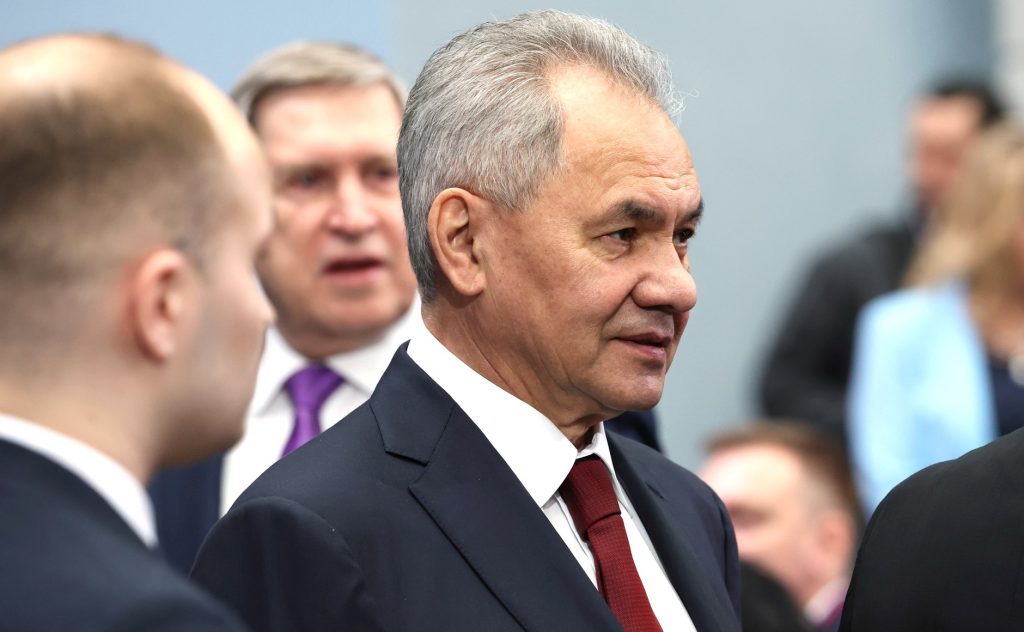
“We didn’t start this war in Donbas, but we will do everything to end it, to eradicate Nazism” – Putin repeats this phrase from speech to speech. “There are problems in the army, but there is an understanding of how to solve them; work goes on continuously at the front and rear. People send letters, parcels, warm clothes, and camouflage nets to the front and transfer funds from their sometimes modest savings. I repeat: such help is priceless; everyone contributes to our common victory. Our heroes on the front line in the trenches, where it is most difficult, know that the whole country is with them!” The President of the Russian Federation tried to show that he knew about the problems in the army and that these problems would be eradicated.
An important thesis was voiced in the speech: “Russia is ready to contact the United States on a dialogue on strategic stability.” That is, Putin proposed returning to the discussion of those topics that reached a dead end in December 2021 – January 2022 and which, among other things, became a prelude to the war in Ukraine. Putin called it hypocrisy for the West to discuss strategic stability while trying to inflict a strategic defeat on Russia on the battlefield.
However, immediately after this statement, there was a series of theses that should show Russia’s readiness to continue the war and to confront the West: “Russia’s strategic nuclear forces are in a state of full readiness,” “The Sarmat complex has been delivered to the troops, we will demonstrate it soon.”, “The Zircon sea-based hypersonic strike complex has already been used in battle, this system is already in operation,” “Work on new weapons in Russia continues, they will soon hear about them,” and so on.
Issues of security and stability must be resolved in a single complex, Putin said. “The West is also trying to drag Russia into an arms race, which has already been done once. However, Moscow’s task is to develop the defence industry in such a way as to develop the country’s scientific and technological potential. It is necessary to distribute resources as rationally as possible. The West is trying to drag Russia into an arms race, to repeat the trick as with the USSR in the 1980s,” Putin stated. It is worth noting that the message contained many allusions to the events of the second half of the 80s of the twentieth century. One gets the distinct impression that a trend has been launched in Russia to revise the history and political decisions of the era of Mikhail Gorbachev.
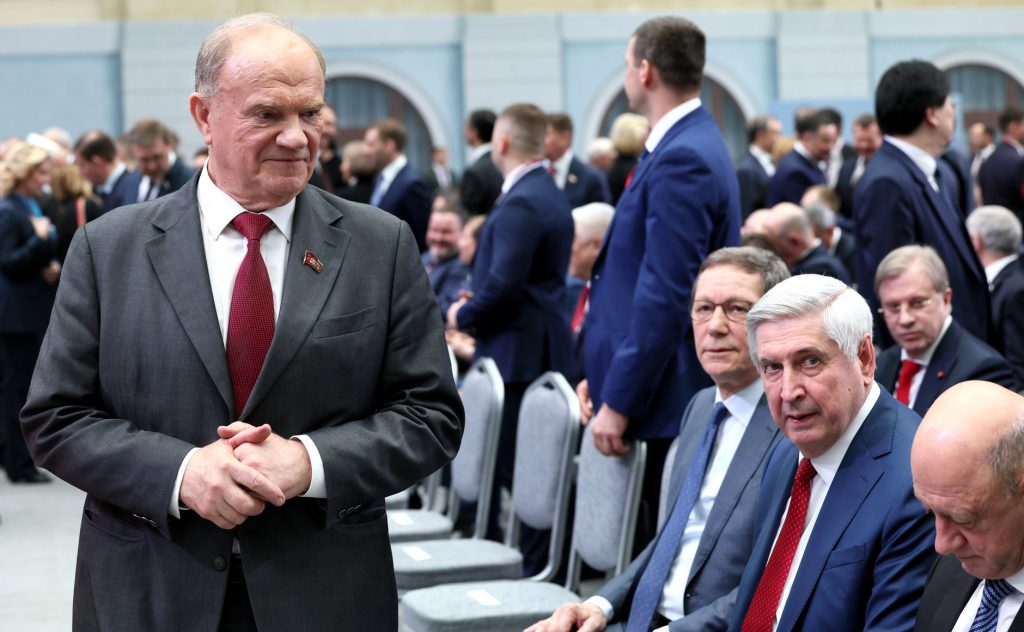
Regarding reports that the Russian Federation wants to attack the West, Putin said: “They are simply talking nonsense.” Putin also called the reports that the Russian Federation intends to place nuclear weapons in space a hoax: “This is demagoguery before the elections.”
According to Putin, Western politicians would like to do with Russia the same thing as with many regions of the world: “The West, instead of the Russian Federation, needs a dependent, fading, dying space where you can do whatever you want.” Everything that the West comes up with really threatens a conflict with the use of nuclear weapons, which means the destruction of civilization, Putin said.
Putin set the task in terms of military development: “We need to seriously strengthen the military group in the western direction after Sweden and Finland are drawn into NATO.” With this, he explained the latest decisions regarding military-administrative reform and the creation of new military districts in the European part of Russia.
Then came a series of threats towards the West: “We remember the fate of those who sent their contingents to the territory of our country; now, the consequences for the interventionists will be much more tragic. We also have weapons that can hit targets on their territory!” Putin noted that the West does not perceive what is happening in Ukraine – they think that these are “some kind of cartoons.”
Traditionally, he said that “Russophobia deprives one of reason.” Putin asked the government to finance programs to promote the Russian language and multinational culture in the CIS and the world.
After this, he stated that Russia must and is obliged to return to the system of international relations, which they tried to throw out in 2014 and 2022. “We must work to develop a security framework in Eurasia. We are ready for dialogue with all interested countries. No lasting world order is possible without a sovereign, strong Russia.” Putin also clearly hinted that Russia and China should guarantee security in Europe.
According to Putin, Moscow is striving to unite the global majority. “Now, many monopolies and stereotypes are collapsing. By 2028, the BRICS countries will account for about 37% of global GDP, while the G7 figure will drop to 26%. Many former monopolies and stereotypes of the global economy are crumbling. Obviously, developing relations with the BRICS countries and the Global South will continue to be a priority of Russian foreign policy.” In particular, Putin believes the Russia-Africa summits were a real breakthrough and intends to develop this direction.
“Last year, Russia’s economy grew at a rate higher than the world’s and outstripped the G7 states,” Putin said. He immediately set an ambitious goal: “We can hope that we will become one of the four largest economic powers in the world,” overtaking Japan in terms of GDP by 2030 (in 2000, Russia’s GDP was lower than Portugal’s).
“Russia will build a new global financial architecture on an advanced technological base, free from political interference,” Putin said.
After this, Putin moved on to his favourite topic: “Russia remains a country with traditional values.” This thesis is one of the main ones on the current political agenda. “Russia has been and remains a bastion of traditional values, and its choice is shared by people around the world, including in the West.”
Hence, the priority is given to caring for the family as the basis of “traditional values.” “A large family with many children should become the norm,” Putin said. The Russian president spoke about a steady increase in the birth rate over the next six years. Speaking about the birth rate, among the priority problems, he quoted low incomes in families. The poverty level should be below 7%, and it should be reduced to 12% among large families. Putin has set the goal of halving poverty among large families in the Russian Federation by 2030.
After this, Putin announced a new national project, “Family.” According to the project, at least 75 billion rubles will be allocated to regions with low birth rates to increase family support programs. Funds will begin to arrive next year. Putin proposed extending preferential family mortgages until 2030. “The availability of social contracts will be expanded; this will require an additional 100 billion rubles they are provided. It is proposed to double tax deductions for the birth of a second and third child.” Putin also proposed extending the maternity capital program until 2030. Payment of 450 thousand rubles. to repay the mortgage upon the birth of the third child will be extended until 2030, “there is money for this.”
Putin also proposed creating a comprehensive program to protect motherhood and preserve reproductive health.
The second national project announced by Putin is “Long and Active Life.” Putin proposed creating a platform in the Russian Federation to help maintain and maintain health throughout life.
He said that the amount of alcohol consumed in Russia, especially spirits, has decreased (however, these data do not correlate with those published by TASS a month ago). The average life expectancy in the Russian Federation is now 73 years and should be at least 78 years by 2030; in the future, Putin believes that Russians should reach the “80+” level.
According to Putin’s statement, next year, more than 400 billion rubles will be allocated to overhaul schools and kindergartens in the country’s regions. He also remarked, “In the next six years, we will additionally allocate more than 1 trillion rubles for the construction, repair and equipment of healthcare facilities.”
Putin announced tax deductions for passing GTO standards and undergoing medical examination.
The third announced national project is “Youth of Russia.”
Putin ordered in the coming years to update or open medical offices in schools where this is required. He also proposed introducing an additional payment of 5 thousand rubles per month for all advisers to educational directors in schools and colleges starting September 1, 2024. The Russian President called for testing a new remuneration model for public sector employees in pilot regions and, in 2026, to make a final decision on this issue for the entire country.
Several specific proposals were made: from October 1, 2024, a payment of 5 thousand rubles will be introduced for all advisers to educational directors in schools and colleges; in small settlements where less than 100 thousand people live, from March 1, payments for class management and supervision will be doubled – up to 10 thousand rubles; 9 billion rubles will be allocated to update the technical base in pedagogical universities.
Interestingly, Putin paid important attention to the Unified State Exam mechanism, which, in his opinion, should be improved. “The discrepancy between the school curriculum and exam questions forces us to hire tutors. I ask the government to sort this out,” Putin said. Putin proposed giving school graduates a second chance to retake the Unified State Exam in one of the subjects before the end of the university admissions campaign. It is expected that this topic will be trendy among young Russians.
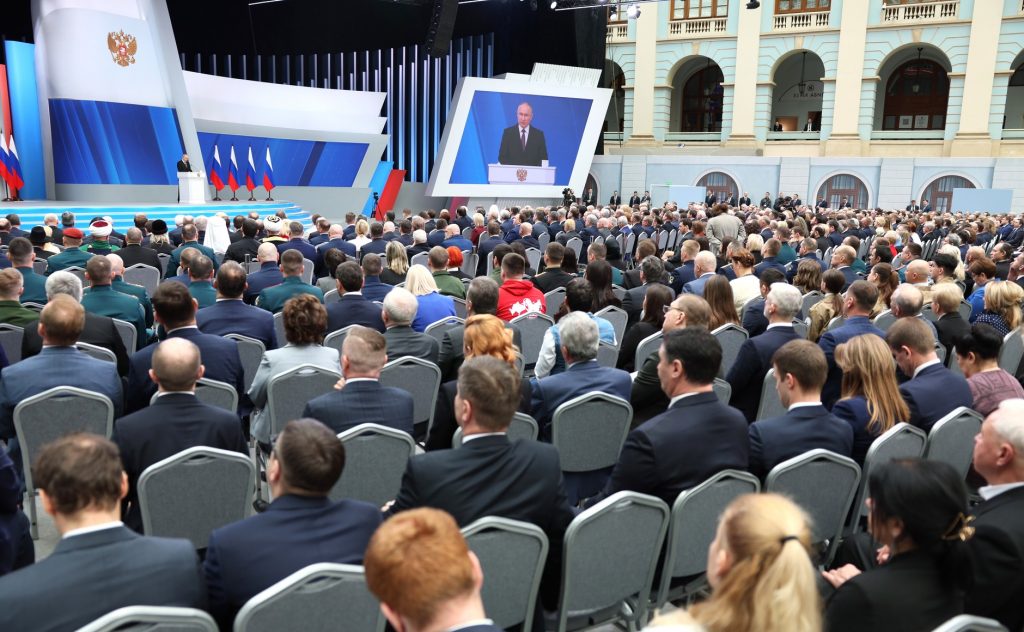
The educational process must be designed for new challenges facing society. “The Russian economy is becoming more complex, technologically advanced, and therefore more sustainable. And the educational load on children should be reasonable and balanced,” Putin believes.
The fourth national project is “Personnel”. And here is a very broad gesture towards Sergei Kiriyenko, who leads personnel policy in Russia. Putin said that the lack of personnel is one of the risks for the Russian economy. “The risks to Russia’s sustainable economic growth are a shortage of personnel and technologies,” Putin believes.
“Starting this year, Russia has launched a career guidance system. The Russian President emphasised that schoolchildren should get acquainted with workshops, factory museums, and so on. Today’s teenagers must become professionals in their field, ready to work in the economy of the 21st century,” said the President of the Russian Federation.
Putin proposed building at least 40 student campuses and allocating 400 billion rubles; it is planned to overhaul 800 university dormitories. By 2028, training about a million blue-collar specialists for high-tech industries is necessary.
The Priority 2030 program will be extended for six years; 190 billion rubles will be allocated for this purpose.
Putin also announced plans to launch new national projects in the field of technological development.
Science is the foundation of Russia’s technological development, Putin said. “We must more than double investment in research and development to 2% of GDP by 2030. Revenues in this area from private businesses should also increase. No less than double,” said the President of the Russian Federation. He proposed increasing the level of remuneration for teachers of fundamental disciplines in universities.
Putin called for reducing the share of imports in GDP to 17% by 2030. Last year, this figure was at 19%. One of the key objectives is to increase labour productivity. Non-resource, non-energy exports of the Russian Federation should increase by two-thirds over six years. The Russian Federation should not produce everything, but it needs to increase the production of consumer goods, medicines, vehicles and several other products. By 2030, Russia should be among the 25 leading countries in the number of industrial robots. It is necessary to introduce digital technologies into management to increase labour productivity.
Putin intends to modernise at least 10 million square meters in the next six years. m of production space. By 2030, Putin said that at least 40% of medium and large enterprises in the Russian Federation should be covered by projects to increase labour productivity.
Putin said three hundred billion rubles will be additionally allocated to capitalise the Industrial Development Fund. It will be aimed at supporting high-tech projects. By 2030, the Russian President noted that it is necessary to create at least 100 additional technology parks in the Russian Federation.
According to Putin, the volume of investment in key areas of the Russian economy should increase by 70% by 2030.
The President of the Russian Federation called for the launch of a “savings certificate” for more than three years at a favourable interest rate. Placing funds for the long term will be possible, and banks will offer more favourable interest income. These funds will be insured for amounts up to 2.8 million rubles. The state will insure accumulated pension savings of 2 million 800 thousand rubles.
Putin believes a responsible business should operate in Russian jurisdiction and not withdraw money. “We don’t need to take it there, and we won’t think about how to get it there” – this is how Putin addressed business, referring to frozen Russian assets in the West. The President of the Russian Federation called for investing in Russia. “We need to invest resources in Russia, in the regions, in the development of companies, in personnel training. The most reliable protection of Russian business assets and capital is our strong, sovereign country,” Putin said.
He also announced new insurance guarantees and a tax deduction for citizens’ investments in the stock market.
Putin called on businesses to abandon the artificial division of business.
“The most reliable protection of capital is our strong sovereign country,” Putin noted. He added that most entrepreneurs adhere to patriotic positions. An attack was immediately made on the security forces: “No one is allowed to oppress businessmen or break the law for personal gain illegally,” the President noted. These people provide jobs for many.”
According to Putin, the authorities call to help in this process.
Putin instructed the Cabinet of Ministers to work out the parameters of an amnesty for small companies forced to use tax optimisation schemes.
He said that the temporary moratorium on company inspections had yielded results. From January 1, 2025, the President proposes completely switching to a risk-based approach, enshrining it in law. This will minimise the number of checks. A business operating in Russia must guarantee its assets’ inviolability. Small businesses can take a six-month credit holiday every five years without deteriorating their credit history.
Putin instructed to provide a gradual increase in payments from 2025 for companies switching from a simplified to a general taxation system.
Putin also announced the launch of another fifth national project, “Data Economy,” with a budget of 700 billion rubles. He instructed us to provide support measures for companies and startups working with Big Data and creating software. According to Putin, computing resources need to be increased in Russia. By 2030, the total power of domestic supercomputers should be increased at least ten times. Russia will also allocate 116 billion rubles to develop its satellite constellation.
Speaking about specific sectors of the economy, Putin noted that agriculture is actively developing in Russia. In particular, the country has become a world leader in wheat production. The government will continue to develop rural areas, paying special attention to coastal regions.
It was stated that it is necessary to reduce the debt burden of the constituent entities of the Russian Federation. Putin proposed writing off 2/3 of the debt on budget loans from the regions. According to preliminary estimates, this will save about 200 billion rubles annually from 2025 to 2028. Putin offered to redirect the funds, which regions currently return to the Russian budget as loan payments, back to them to foster their development. He instructed to extend the support program for 10 “lagging” regions for six years. By 2030, Putin said 10 “lagging” Russian regions should become self-sufficient.
“In 2021, Russia launched a program of infrastructure budget loans. This program was then expanded. Regions note the high efficiency of this mechanism. Starting from 2025, we will increase the portfolio of structural loans in the regions by at least 250 billion rubles annually,” Putin said.
He also proposed studying approaches to modernising the fiscal system. “A more equitable distribution of the tax burden is needed. We also need to close all sorts of loopholes companies use to evade taxes,” Putin said. “We need to think about a more equitable distribution of the tax burden towards those with higher corporate and personal income.” Putin proposed fixing the main tax parameters until 2030 and introducing a differentiated taxation system in the Russian Federation. Putin ordered to modernise the tax system and fix it in a new form by 2030. It looks like a hint at a progressive tax scale.
The President of the Russian Federation also proposed developing master plans for 200 Russian cities.
Putin thanked representatives of local authorities, especially those located near the combat zone.
Putin said that at least 1,000 cultural heritage sites need to be put in order in the cultural sphere. He proposed expanding the Pushkin Card program and stated that the Zemstvo Cultural Worker program would be launched in 2025. Putin instructed to develop a regulatory framework for protecting cultural heritage sites and draft a program for their preservation for 20 years. Over six years, more than 100 billion rubles will be allocated to educational, educational, and historical projects in cinema, the Internet and social networks.
Among other initiatives of the Russian President:
- Putin offered to launch a three-year budget and a six-year financial plan.
- Russia will continue special mortgage programs for Arctic and Far East residents, Donbas and Novorossiya. Participants and veterans of the [so-called] “SMO” will be able to receive a mortgage at 2%.
- Putin ordered the launch of a new program for the resettlement of emergency housing.
- More than 4.5 trillion rubles will be allocated until 2030 for modernising housing and communal services (including private funds).
- 150 billion rubles will be allocated for a public transport renewal program.
- Kamchatka and several other regions are being gasified using LNG.
- Gardening partnerships will be included in the social gasification program.
- In terms of ecology, Putin ordered to halve the pollution of Russian water bodies. Putin also announced the need to sort all solid waste by 2030 and reuse at least a quarter. He stated that since 2021, more forests are being restored in Russia than are being cut down. Announced the creation of an Environmental and Environmental Protection Fund with a volume of 1 billion rubles.
- Putin called for increasing the salaries of specialists working in environmental protection. According to him, the problems they solve are significant, and the income is small.
- Residents of the northern and Far Eastern territories will receive subsidies for heating equipment; 32 billion rubles will be allocated for this, Putin said.
- By 2030, the authorities intend to create infrastructure for eco-tourism in all national parks. The implementation of the federal project “Clean Water” will continue; the problem of supplying high-quality drinking water remains exceptionally relevant for many cities and rural settlements in Russia
- Regarding air transportation, Putin said air travel in the Russian Federation should become more accessible. The Russian Federation will allocate 250 billion rubles to develop the airport network. In six years, it is necessary to modernise the infrastructure of at least 75 airports. “It is also necessary to update the air fleet using domestic aircraft. They must meet all modern requirements. A difficult task, we bought too much abroad, but they didn’t develop their production,” Putin noted. The intensity of passenger aviation in the Russian Federation should increase by 1.5 times by 2030.
- Putin also said that the first high-speed rail route between Moscow and St. Petersburg will pass through Tver and Veliky Novgorod. Then, highways will be built to the Urals, Belarus and other popular destinations.
- In 2024, the M12 highway will be extended to Yekaterinburg and next year to Tyumen. In the future, this road will pass through the entire country. Putin instructed the Cabinet of Ministers to provide a financing scheme for constructing the Dzhubga-Sochi highway.
- Putin instructed to deal with queues at border checkpoints; inspection time should not exceed 10 minutes.
- By 2030, the tourist flow in Russia should double.
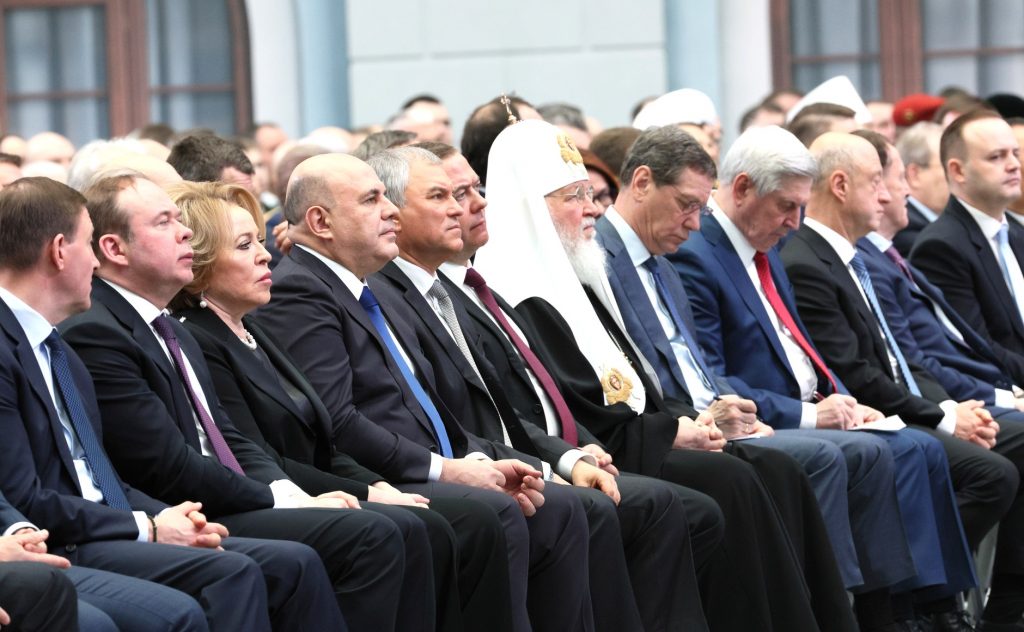
At the end of his speech, Putin returned to the topic of the [so-called] “SMO.” He said he constantly meets with its participants: “These people, of course, will not back down, will not let you down and will not sell out.” Putin called for promoting members of the [so-called] “SMO” in various fields: business, government, and social activities.
The President of the Russian Federation stated that the word “elite” has discredited itself in many ways: “The true, real elite are those who serve Russia, workers and warriors who have proven their devotion to Russia.” “Today, implementing all arranged plans literally depends on the soldiers, officers, volunteers, everyone who fights at the front.”
Putin announced the “Time of Heroes” personnel program for participants in the [so-called] “SMO.” The program will launch on March 1. Participants in hostilities will be able to receive higher education in leading universities of the Russian Federation as a priority. Putin said they will also receive priority promotion when entering military courses, schools and military academies. “Participants in the [so-called] SMO should take leading roles: lead regions, lead the largest domestic projects. Thus, a new “class” will be formed in Russia – “veterans of the Special Military Operation” who, in the future, will become the support of presidential power. Such people can be handed over and entrusted to Russia in the future,” Putin said. And he immediately turned to the Minister of Defense: “I ask the Ministry of Defense to support the desire of officers to participate in the new personnel program.”
Putin instructed to approve all national projects by the end of 2024.
The Russian President thanked his colleagues from the government, departments, and regions who have painstakingly built the system all these years.
In conclusion, Putin again turned to pathos: “I believe in our victories, successes, in the future of Russia. We are one big family; we are together, so we will do everything as we want, plan and dream.”
Based on the results of Vladimir Putin’s Address, the following conclusions can be drawn:
- Putin remains faithful to conservative ideology with a strong emphasis on social specifics (so-called social conservatism, whose adherents are also Donald Trump, Recep Tayyip Erdogan and others);
- The increased amount of costs for new national projects will require a radical reorientation of the economy; that is, shortly, the economic model of the Russian Federation will be significantly reformed – primarily by preventing the outflow of capital and stimulating the development of the domestic market;
- The program is super-ambitious, and therefore, it should be carefully studied – including when developing Ukrainian models of countering Russian aggression;
- The transition of power, which has been discussed recently in Russia, will begin not so much from the upper echelon but from the middle echelon, and a significant role in this process will be played by “new elites”, which will be formed from among people who have gone through combat operations in Ukraine;
- The Russian authorities will go through serious purges after the elections;
- Severe complaints were made against Anton Siluanov and Elvira Nabiullina;
- The president paid veiled compliments to Sergei Chemezov, Maxim Oreshkin, Sergei Nechaev, Sergei Kiriyenko, Denis Manturov, Kirill Dmitriev, Dmitry Patrushev, Maksut Shadayev, Marat Khusnullin, Yuri Trutnev, Alexander Novak, Vladimir Medinsky, Sergei Ivanov. Their theses formed the basis of the Message. Obviously, in this way, Putin hinted at who might join the government after the elections or remain in the inner circle.

